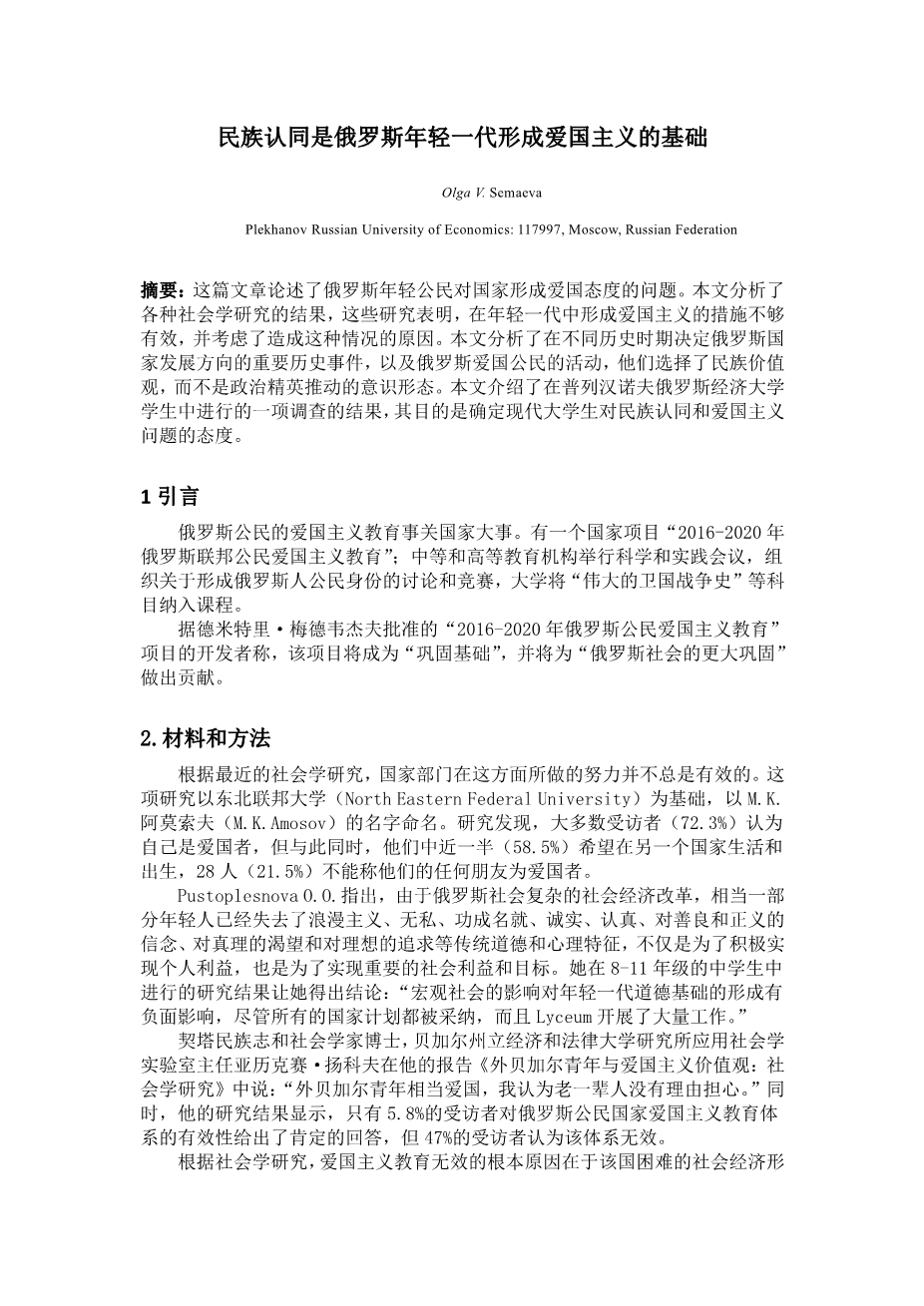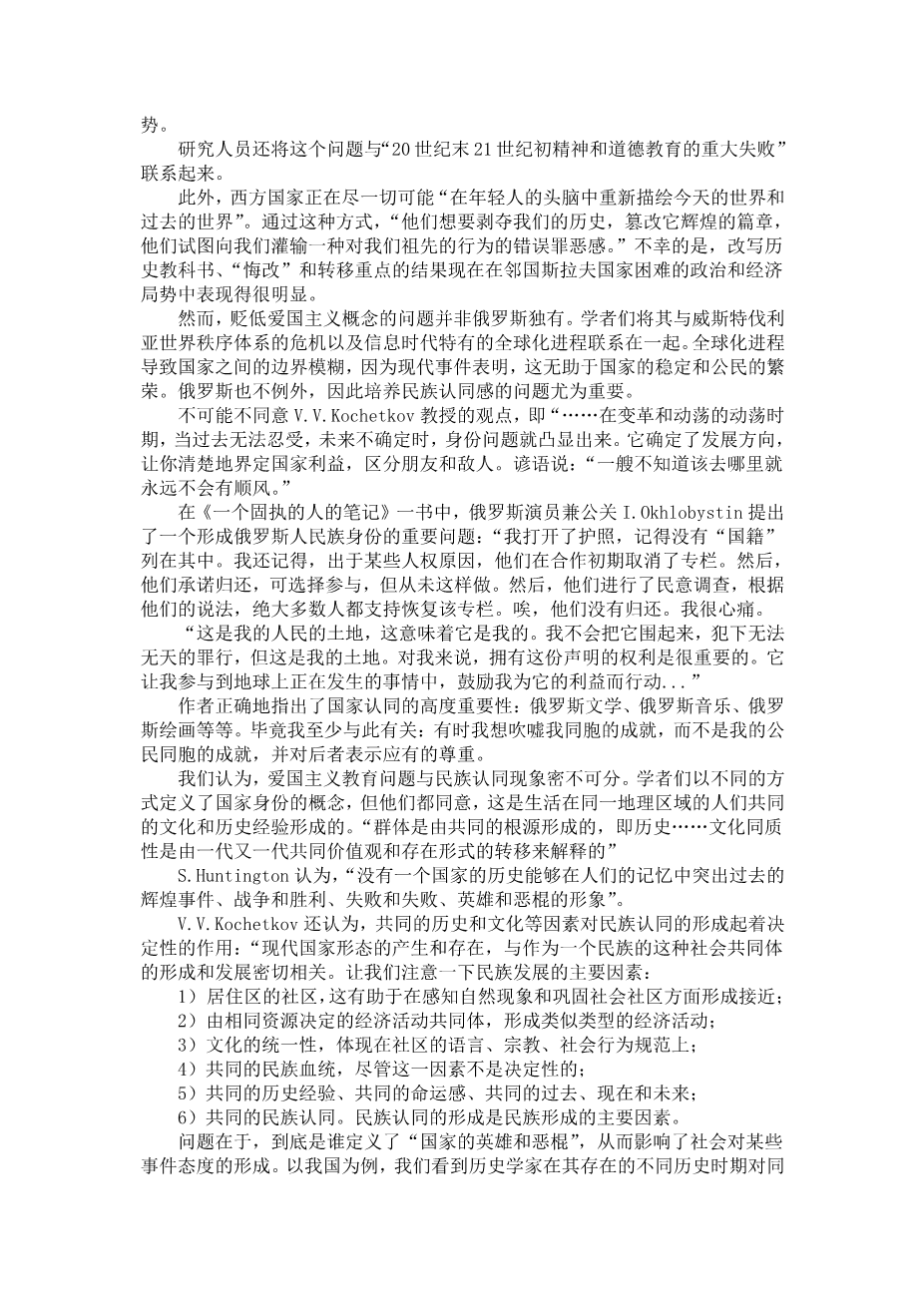民族认同是俄罗斯年轻一代形成爱国主义的基础外文翻译资料
2023-05-14 19:37:51
SHS Web of Conferences 94, 03007 (2021)
'State. Politics. Society' 2020
https://doi.org/10.1051/shsconf/20219403007
National identity as the basis for the formation of patriotism among the younger generation of Russians
Olga V. Semaeva *
Plekhanov Russian University of Economics: 117997, Moscow, Russian Federation
Abstract. The article deals with the issues of forming a patriotic attitude of young Russian citizens to their country. The paper analyzes the results of various sociological studies that indicate that measures to form patriotism among the younger generation are not sufficiently effective and considers the causes underlying this situation. The article analyzes important historical events that determined the vector of development of the Russian state in different historical epochs and the activity of Patriotic citizens of Russia, who chose national values over the ideology promoted by political elites. The article presents the results of a survey conducted among students of of Plekhanov Russian University of Economics, the purpose of which was to determine the attitude of modern University students to the problem of national identification and patriotism.
1 Introduction
Patriotic education of Russian citizens is a matter of national importance. There is a state program 'Patriotic education of citizens of the Russian Federation for 2016-2020' [1]; secondary and higher educational institutions hold scientific and practical conferences, organize discussions and competitions on the topic of forming the civil identity of Russians, universities introduce such subjects as 'the History of the great Patriotic war' into the curriculum.
According to the developers of the program 'Patriotic education of Russian citizens for 2016-2020', approved by Dmitry Medvedev, it will become a 'cementing Foundation' and will contribute to 'even greater consolidation of Russian society'.
2 Materials and Methods
According to recent sociological research, the efforts made by state departments in this direction are not always effective. The study conducted on the basis of the North-Eastern Federal University named after M. K. Amosov, revealed the fact that the majority of respondents (72.3%) consider themselves patriots, but at the same time, almost half of them
* Corresponding author: ORCID: 0000-0001-7457- 1314 semaewa.olga@yandex.ru
copy; The Authors, published by EDP Sciences. This is an open access article distributed under the terms of the Creative Commons Attribution License 4.0 (http://creativecommons.org/licenses/by/4.0/).
SHS Web of Conferences 94, 03007 (2021)
'State. Politics. Society' 2020
https://doi.org/10.1051/shsconf/20219403007
(58.5%) would like to live and be born in another country, 28 people (21.5%) could not call any of their friends a patriot. '[2]
Pustoplesnova O. O points to the fact that due to the complex social-economic reforms of Russian society, a significant part of young people have lost such traditional moral and psychological traits as romanticism, selflessness, readiness for feats, honesty, conscientiousness, faith in goodness and justice, the desire for truth and the search for an ideal, for the positive realization of not only personal, but also socially significant interests and goals. [3] The results of her research among secondary school students in grades 8- 11 allow her to conclude: 'the influence of the macro-society has a negative impact on the formation of the moral foundations of the younger generation, despite all the state programs adopted and the great work carried out by the Lyceum.' [3]
Chita ethnographer and sociologist, PhD, head of the Laboratory of Applied Sociology of the Institute of Baikal state University of Economics and law Alexey Yankov says in his report 'The Youth of Transbaikalia and the Values of Patriotism: a Sociological Study”: “the youth of Transbaikalia is quite patriotic, and the older generation, I think, has no reason to worry” . At the same time, the results of his research show that only 5.8% of respondents gave a positive answer to the question about the effectiveness of the system of state Patriotic education of Russian citizens, but 47% of respondents consider it ineffective. [4]
According to sociological research, the causes underlying the ineffectiveness of Patriotic education lie in the difficult socio-economic situation in the country. [2];[3]
Researchers also associate this problem with 'a significant failure in spiritual and moral education in the late twentieth and early twenty-first centuries.' [5]
In addition, Western countries are doing everything possible to 'redraw the idea of the world today and the world of the past in young minds.raquo;[5]. In this way 'they want to deprive us of our history, falsifying its glorious pages, they are trying to instill in us a false sense of guilt for the actions of our ancestors.' [6] . Unfortunately, the results of rewriting history textbooks,' repentance', and shifting the emphasis are now evident in the difficult political and economic situation in the neighboring Slavic States.
However, the problem of d
剩余内容已隐藏,支付完成后下载完整资料


英语译文共 6 页,剩余内容已隐藏,支付完成后下载完整资料
资料编号:[591521],资料为PDF文档或Word文档,PDF文档可免费转换为Word




